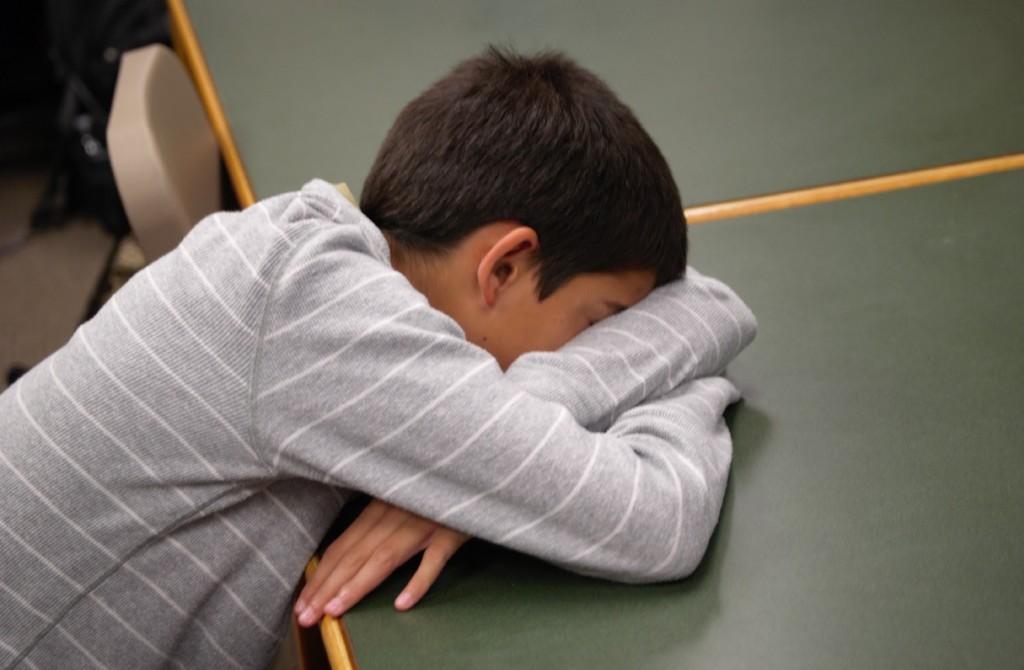Sleep deprivation plagues students
A student falls asleep in the Media Center.
Most teenagers are notorious for pulling late-nighters, and it is seemingly apparent when they drag themselves into school the next day. Only 15 percent of students sleep the nine hours required for their bodies to perform at optimum levels. While a few late nights a week might not seem deleterious, many students do not realize the harmful long-term effects sleep deprivation can bring.
In a 2006 poll called Sleep in America, The National Sleep Foundation (NSF) found that students who do not sleep the required amount of time not only risk being more likely to fall asleep in class but also to become depressed as well. Sleep deprived teenagers were additionally found to be more likely to receive lower grades, be involved in car accidents and experience moodiness.
“I’m always tired when I don’t get much sleep, obviously,” said sophomore Rohan Makhecha, “but I’m also grouchier and it’s hard to concentrate in class.”
Even though most students feel the effects of lack of sleep, not all feel that sleep is important. When five students were asked which of the following they would sacrifice – academics, sports, a social life, or sleep, three out of the five chose sleep. Senior Meghan Santella said the other three aspects were more important to her life and she “never sleeps.” This lack of sleep seemed to be a common theme, even among those who chose to forfeit a different aspect.
“I would definitely sacrifice academics,” said freshman Erika von Behren, “but I only sleep from midnight to 6:20 a.m. anyways.”
Though it might seem outlandish to think most students would sacrifice a good night’s sleep, for many students this is reality. On top of these activities many students also juggle work, clubs, and more. Between juggling soccer, basketball, and a challenging course load, junior Raiven Owusu rarely gets a good night’s sleep.
“I don’t really get a lot of sleep, especially when I have projects due,” Owusu said. “On average, I have three to four hours of practice a day and I get around six hours of sleep a night.”
Raiven’s story is a common one at Adams because so many students participate in a myriad of activities daily. Unfortunately, the more a student participates in, the less time there is to sleep. While some feel pressured to quit activities they love, more feel pressured to participate in more to boost college resumes, even if it means less time for homework and sleep.
When asked if she felt she needed to participate in more and more extracurricular activities, senior Katie Wareck said, “Definitely. I feel like that’s all that matters.”
On the issue of sleep, there is no easy fix. Since teenagers naturally fall asleep after 11 p.m., the NSF has proposed schools start an hour later to give teenagers another hour of sleep. Research from the University of Minnesota found a school that started at 8:40 a.m. as opposed to 7:15 a.m. had higher attendance rates and students and staff reported being fresher and more alert. Students also claimed they did not go to bed any later than if school started at 7:15. However, not everyone at Adams is on board with this idea.
“I think I would like the sleep, but I wouldn’t like school starting later,” said sophomore Chris Abell. “Having to end the school day later wouldn’t be worth it to me.”
For some students, the perfect solution would be teachers giving less homework or being more flexible on due dates. In Mr. Lamkin’s class, homework for an entire chapter is due on test or quiz date. Many students have said this flexible due date is beneficial because students make the decision about how to schedule homework time.
“I like it[Mr. Lamkin’s class] because if I have a lot of stuff to do one night, I can still manage my time and make up for it later,” said junior Adam Polosky. “If one night I have practice and lots of homework, I can put math off until I have a free day.”
Others say the problem is not in the number of activities students participate in or the amount of homework given, but rather the amount of time spent procrastinating. Students often find other things more exciting to fill the daylight and spend the late night or early morning cramming in homework.
“I usually go to sleep at 10 p.m., but I wake up around 4-4:30 a.m. I think I’d sleep more if I didn’t procrastinate as much,” said sophomore Nick Dance. “I wake up so early to finish homework.”
Tackling the dilemma of sleep deprivation is difficult as there seems to be no clear-cut solution. With students’ lives becoming busier than ever, sleep is taking the back seat to activities like homework and extracurricular activities. Sleep is a vital part of students’ lives and should become a bigger priority. Through time management and only biting off as much as they can chew, students can find more hours in the day to finish homework and uphold their commitments. Schools and teachers can help accommodate students without sacrificing the integrity of their curriculum. In high school, a few late nights are unavoidable; sleep deprivation is not.





